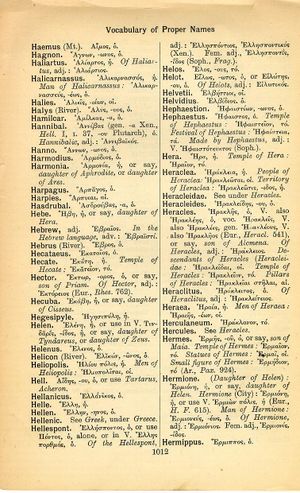Hannibal: Difference between revisions
δρυὸς πεσούσης πᾶς ἀνὴρ ξυλεύεται → when the oak falls, everyone cuts wood | when an oak has fallen, every man gathers wood | on the fall of an oak, every man gathers wood | when an oak has fallen, every man becomes a woodcutter | one takes advantage of somebody who has lost his strength | one takes advantage of somebody who has lost his power | when the tree is fallen, every man goes to it with his hatchet
(Names) |
(6_7) |
||
| Line 3: | Line 3: | ||
<b class="b2">Hannibalic</b>, adj.: [[Ἀννιβαϊκός]]. | <b class="b2">Hannibalic</b>, adj.: [[Ἀννιβαϊκός]]. | ||
}} | |||
{{Lewis | |||
|lshtext=<b>Hannĭbal</b>: ([[Annibal]]), ălis (ālis, Enn. Sat. 14 Vahl.), = Ἀννίβας [Phoen.],<br /><b>I</b> a Punic [[surname]]. The [[most]] [[celebrated]] of the [[name]] is [[Hannibal]], [[son]] of [[Hamilcar]], the [[leader]] of the Carthaginians in the [[second]] Punic [[war]], Nep. Han. 1 al.; Liv. 21, 1 al.; Hor. C. 4, 8, 16; Cic. de Or. 1, 48, 210 al.: et Romani suum Hannibalem habent, Liv. 27, 16, 10. —Prov.: [[Hannibal]] ad portas, of [[imminent]] and [[great]] [[danger]], Cic. Fin. 4, 9, 22: [[Mithridates]], [[odio]] in Romanos [[Hannibal]], a [[Hannibal]], Vell. 2, 18, 1. | |||
}} | }} | ||
Revision as of 08:03, 13 August 2017
English > Greek (Woodhouse)
Ἀννίβις (gen. -α Xen., Hell. I, I. 37, -ου Plutarch), ὁ.
Hannibalic, adj.: Ἀννιβαϊκός.
Latin > English (Lewis & Short)
Hannĭbal: (Annibal), ălis (ālis, Enn. Sat. 14 Vahl.), = Ἀννίβας [Phoen.],
I a Punic surname. The most celebrated of the name is Hannibal, son of Hamilcar, the leader of the Carthaginians in the second Punic war, Nep. Han. 1 al.; Liv. 21, 1 al.; Hor. C. 4, 8, 16; Cic. de Or. 1, 48, 210 al.: et Romani suum Hannibalem habent, Liv. 27, 16, 10. —Prov.: Hannibal ad portas, of imminent and great danger, Cic. Fin. 4, 9, 22: Mithridates, odio in Romanos Hannibal, a Hannibal, Vell. 2, 18, 1.

